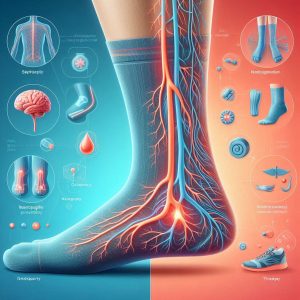Understanding Neuropathy: Shedding Light on a Silent Struggle
Neuropathy is more than just a medical term—it represents the often-hidden battle faced by individuals coping with nerve damage.
It affects millions of people worldwide, manifesting in ways that can deeply impact daily life. Whether it’s a persistent burning
sensation, numbness in extremities, or sharp, shooting pain, neuropathy challenges not only physical health but emotional resilience as well.
Understanding this condition is crucial for empowering those affected to navigate their journey toward relief and recovery.

What Exactly Is Neuropathy?
Neuropathy refers to damage to the peripheral nervous system, the vast network of nerves that connects the brain and spinal cord
to the rest of the body. When these nerves are injured or malfunction, the signals they send can become distorted, exaggerated, or completely absent. Common symptoms of neuropathy include:
- Numbness or Tingling: Often starting in the hands or feet, this can progress up the limbs.
- Pain: May be described as burning, sharp, or aching, depending on the nerves affected.
- Weakness: Muscle weakness or difficulty coordinating movement can occur.
- Sensitivity: Even light touch or pressure might trigger pain, known as allodynia.
Types of Neuropathy and Their Unique Challenges
Peripheral Neuropathy
This is the most common type, affecting the nerves outside the brain and spinal cord. It often targets the feet and hands, causing symptoms such as numbness, tingling, and pain.
Autonomic Neuropathy
Involving the autonomic nervous system, this type affects involuntary functions like heart rate, digestion, and bladder control. Symptoms may include dizziness, digestive issues, or abnormal sweating.
Focal Neuropathy
This type is localized to one area or nerve group, such as carpal tunnel syndrome. Symptoms can appear suddenly and usually focus on one specific body part.
Proximal Neuropathy
A rarer form, often seen in older adults with diabetes, it targets the hips, thighs, or buttocks and can cause weakness or pain.
Neuropathy’s Impact on Daily Life
For those living with neuropathy, the condition goes far beyond physical symptoms. It touches nearly every aspect of daily life, often leading to:
- Mobility Issues: Difficulty walking, driving, or performing basic tasks due to pain or weakness.
- Sleep Disturbances: Pain and discomfort can disrupt restful sleep, leading to fatigue.
- Mental Health Struggles: Chronic pain and limitations can contribute to anxiety, depression, and feelings of isolation.
How Neuropathy Is Diagnosed
Diagnosing neuropathy involves piecing together a puzzle of symptoms, medical history, and diagnostic tests. Common steps include:
- Physical Examination: Evaluating symptoms like sensitivity, reflexes, and muscle strength.
- Medical History: Identifying underlying conditions such as diabetes, injuries, or infections.
- Diagnostic Tests:
- Nerve Conduction Studies: Assess how well nerves transmit signals.
- Electromyography (EMG): Measures electrical activity in muscles.
- Blood Tests: Detect underlying causes like vitamin deficiencies or autoimmune disorders.
Treatment and Management Options
Medications
- Pain relievers, including nonsteroidal anti-inflammatory drugs (NSAIDs).
- Prescription drugs like anticonvulsants and antidepressants that alter nerve signals.
- Topical treatments, such as capsaicin cream or lidocaine patches.
Lifestyle Changes
- Regular exercise to maintain circulation and muscle strength.
- A balanced diet rich in vitamins and nutrients.
- Quitting smoking and reducing alcohol consumption, as these can worsen nerve damage.
Therapies
- Physical therapy to improve mobility and reduce discomfort.
- Occupational therapy for adapting daily activities to limitations.
- Complementary therapies like acupuncture and massage.
Advanced Treatments
- Nerve stimulation techniques like transcutaneous electrical nerve stimulation (TENS).
- Surgery for cases caused by nerve compression or specific conditions.
Neuropathy Socks: A Simple Yet Powerful Solution
Specialized neuropathy socks are more than just accessories—they’re valuable tools in managing this challenging condition. Here’s why they’re uniquely suited to provide comfort and relief:
- Promoting Circulation: Compression zones improve blood flow, reducing swelling and alleviating pain.
- Protecting Sensitive Areas: Extra padding offers protection against pressure and injuries.
- Reducing Friction: Seamless designs eliminate irritation and blisters, which are common in neuropathy sufferers.
- Maintaining Hygiene: Moisture-wicking fabrics keep feet dry, reducing the risk of infections.
Nothing Found
Dont worry it happens to the best of us.
